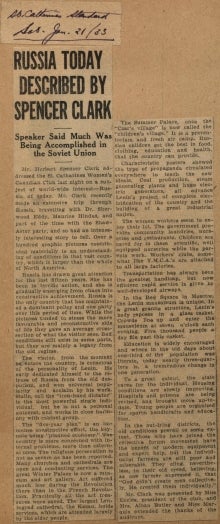Dana Porter Library, first floor
University of Waterloo Library
Waterloo, Ontario N2L 3G1
519-888-4567 x42619 or x42445
 RUSSIA TODAY DESCRIBED BY SPENCER CLARK
RUSSIA TODAY DESCRIBED BY SPENCER CLARK
January 21, 1933
Speaker Said Much Was Being Accomplished in the Soviet Union
Mr. Herbert Spencer Clark addressed the St. Catharines Women’s Canadian Club last night on a subject of world-wide interest-Russia of today. Mr. Clark recently made an extensive trip through Russia, travelling with Dr. Sherwood Eddy, Maurice Hindus, and part of the time with the Shaw-Astor party, and so had an intensely interesting story to tell. Over a hundred graphic pictures contributed materially to an understanding of conditions in that vast country, which is larger than the whole of North America.
Russia has drawn great attention for the last fifteen years. She has' been in terrific action, and she is gradually emerging from chaos into constructive achievement. Russia is the only country that has maintained a dominant policy and one party over this period of time. While the pictures landed to stress the more favourable and reconstructive side of life they gave an average cross-section of what the visitor sees. Bad conditions still exist in some parts, but they are mainly a legacy from the old regime.
The visitor, from the moment he enters me country, is conscious of the personality of Lenin. He early dedicated himself to the release of Russia from the old despotism, and won universal popularity and acclaim by his work. Stalin, call the "iron-hand dictator'' is the most powerful single individual, but he is not a personal autocrat, and works in close harmony with cabinet group.
The "five-year plan" is an immense constructive effort, the keynote being "planned economy." The country is more concerned with internal problems, more than external ones. The religious persecution is not as severe as has been reported. Many churches and cathedrals are open and conducting services. The great Winter Palace is now a museum and art gallery. Art suffered much less during the Revolution there than in the French Revolution. Practically all the art treasures were saved. The largest Leningrad cathedral, the Kazan, holds services, which are attended largely by the older people.
The Summer Palace, once the "Czar's village" is now called the "children's village." It is a preventorium and fresh air camp. Russian children get the best in food, clothing, education and health, that the country can provide.
Characteristic posters showed the type of propaganda circulated everywhere to teach the new ideals. Coal production, steam generating plants and huge electric generators, all advance Lenin's project of complete electrification of the country and the building of a great industrial nation.
The women workers seem to enjoy their lot. The government provides community laundries, nurseries and restaurants. Children are cared for in these scientific, well equipped nurseries while the parents work. Workers' clubs, somewhat like Y.M.C.A.'s are attached to all large factories.
Transportation has always been the greatest handicap, but now efficient rapid service is given by well-developed airways.
In the Red Square in Moscow, the Lenin mausoleum is unique. In a great granite structure, Lenin's body reposes in a glass casket. Crowds line up and enter the mausoleum at seven o'clock each evening. Five thousand people a day file past this casket.
Education is widely encouraged and where in the old days about one-third of the population was literate, today nearly three-quarters is, a tremendous change in one generation.
To a great extent, the state cares for the individual. Housing conditions are slowly improving. Hospitals and prisons are being revised, and brought more up-to-date. Young people are organized for sports, handicrafts and education.
In the out-lying districts, the old conditions prevail to some extent. Those who have joined the collective forum movement have the benefit of modern equipment and expert help, but the individualist farmers are still poor and miserable. They cling, nevertheless, to their old creed, believing, as one farmer expressed it, that "God didn't create men collectively, He created them individually.
Mr. Clark was presented by Miss Eccles, president of the club, and Mrs. Alban Butler and Miss Marquis extended the thanks of the audience.




